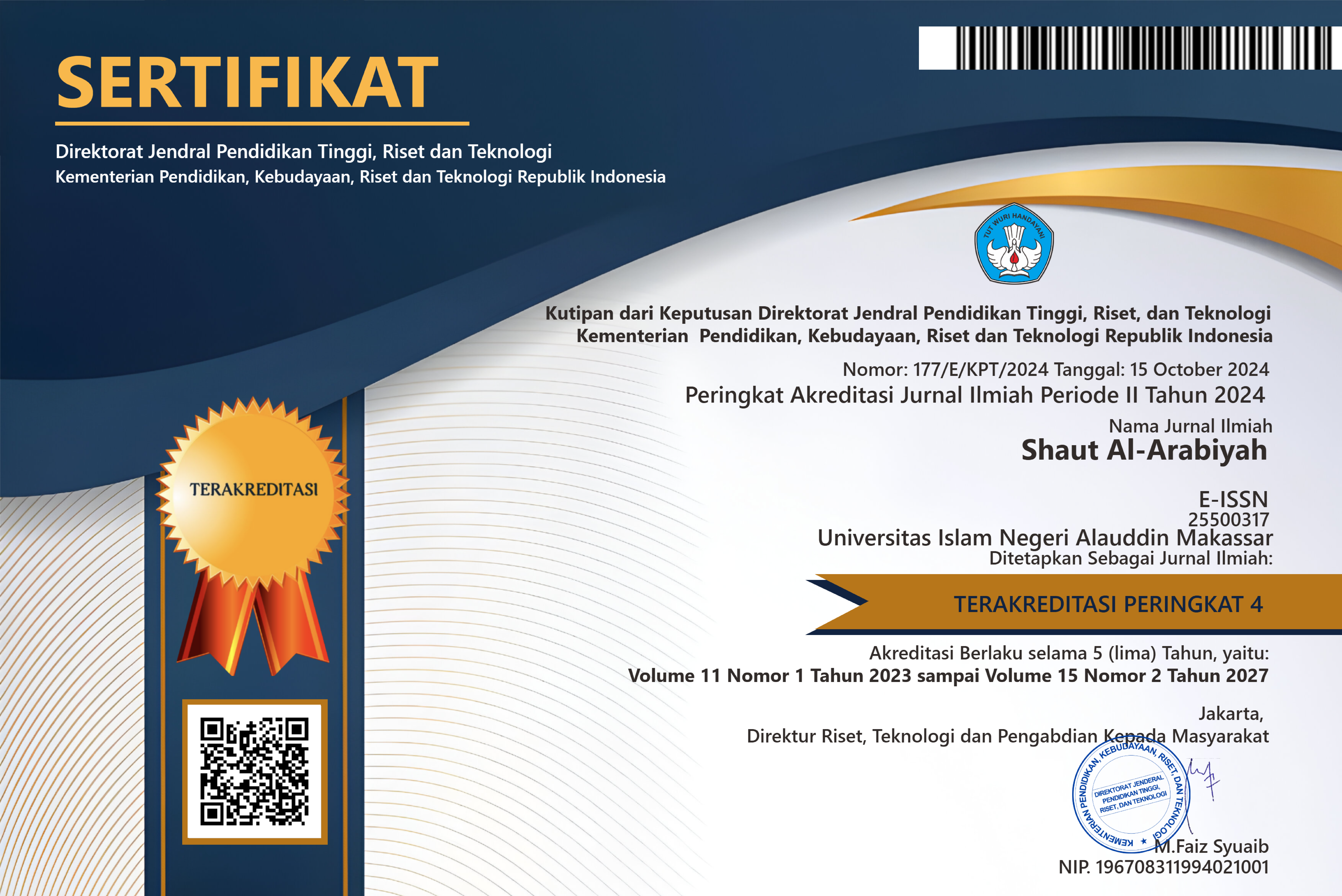Exploring Students’ and Teachers’ Perceptions of Linguistic Immersion in Enhancing Arabic Speaking Proficiency as a Second Language
DOI:
https://doi.org/10.24252/saa.v13i2.58243Keywords:
Linguistic Immersion, Arabic Speaking Proficiency, Second Language AcquisitionAbstract
This investigation examines learner and instructor perspectives on Arabic linguistic immersion at Ponpes Al Kautsar Al Gontory, Lombok-NTB, assessing its effectiveness in developing oral proficiency. Utilizing a qualitative methodology, the research employs in-depth interviews to gather comprehensive experiential data from participants. The collected findings illustrate immersion-based language instruction's transformative potential and implementation challenges. Analysis indicates that immersive approaches substantially enhance learners' communicative confidence, with overwhelming participant consensus regarding their beneficial effects on Arabic acquisition. The result of this study Teachers overwhelmingly (85-100%) support Arabic immersion, noting improved student confidence and skills. Some (14.3%) need clearer immersion concepts.100% of students support Arabic immersion, with 92.3% feeling comfortable. While 76.9% faced initial adaptation challenges, all reported improved confidence and fluency. The results confirm immersion's effectiveness but highlight the need for structured support and gradual implementation. Furthermore, the outcomes underscore critical considerations for immersion initiatives, advocating for structured curricular designs incorporating adaptive scaffolding, individualized methodologies, and culturally appropriate materials in Islamic boarding school environments. The research yields significant conceptual and applied advancements in Arabic pedagogy.
References
Awad Alshehri and Abdulrahman AlShabeb, 2023.“Exploring Attitudes, Identity, and Linguistic Variation among Arabic Speakers: Insights from Acoustic Landscapes,” International Journal of Arabic-English Studies, November 5, https://doi.org/10.33806/ijaes.v24i2.587.
Nisrine El Hannach. 2023.“Linguistic Immersion in the Context of Digital Transformation: -Case Study-,” Journal of E-Learning Research 2, no. 2: 66–86, https://doi.org/10.33422/jelr.v2i2.518.
Lika Harnika et al., 2024. “Impact of Linguistic Environment on Speaking Skills of Female Students at the Arabic Language Center Islamic Boarding School in Indonesia,” Journal of Arabic Language Learning and Teaching (JALLT) 2, no. 2: 121–36, https://doi.org/10.23971/jallt.v2i2.180.
Sultan Almelhes. 2024 “Enhancing Arabic Language Acquisition: Effective Strategies for Addressing Non-Native Learners’ Challenges,” Education Sciences 14, no. 10: 1116, https://doi.org/10.3390/educsci14101116.
Ahmad Maghfurin et al. 2023. “Enhancing Arabic Speaking Skills In Traditional Pesantren,” Alsinatuna 9, no. 1 : 16–28, https://doi.org/10.28918/alsinatuna.v9i1.1957.
Abdulwasiu Isiaq Nasirudeen. 2024. “The Impact of Language Immersion on Developing Arabic Language Skills in Non-Native Learners: A Descriptive Study,” International Journal of Academic Research in Progressive Education and Development 13, no. 4: Pages 531-544, https://doi.org/10.6007/IJARPED/v13-i4/23199.
Widiya Yul et al. 2023. “Unlocking The Secret to Arabic Fluency: Exploring The Critical Role of Language Environment in Maximizing Arabic-Speaking Outcomes,” Arabi : Journal of Arabic Studies 8, no. 1 : 1–10, https://doi.org/10.24865/ajas.v1i2.584.
Sultan Almelhes. 2024. “Enhancing Arabic Language Acquisition: Effective Strategies for Addressing Non-Native Learners’ Challenges,” Education Sciences 14, no. 10: 1116, https://doi.org/10.3390/educsci14101116.
Mohammad H. Al-khresheh. 2024. “The Role of Presentation-Based Activities in Enhancing Speaking Proficiency among Saudi EFL Students: A Quasi-Experimental Study,” Acta Psychologica 243: 104159, https://doi.org/10.1016/j.actpsy.2024.104159.
Rasha Soliman and Saussan Khalil. 2024. “The Teaching of Arabic as a Community Language in the UK,” International Journal of Bilingual Education and Bilingualism 27, no. 9: 1246–57, https://doi.org/10.1080/13670050.2022.2063686.
Tawffeek Mohammed. 2022. “Designing an Arabic Speaking and Listening Skills E- Course: Resources, Activities and Students’ Perceptions,” Electronic Journal of E-Learning 20, no. 1: pp53-68, https://doi.org/10.34190/ejel.20.1.2177.
Prajakt Pande et al., 2021. “Long-Term Effectiveness of Immersive VR Simulations in Undergraduate Science Learning: Lessons from a Media-Comparison Study,” Research in Learning Technology 29, https://doi.org/10.25304/rlt.v29.2482.
Olayide Ogunsiji et al., 2022. “From the World to Western: A Community-Engaged Teaching Strategy to Enhance Students’ Learning of Cultural Issues Relevant to Healthcare,” International Journal of Environmental Research and Public Health 19, no. 9: 5114, https://doi.org/10.3390/ijerph19095114.
Rosa María Rodríguez Izquierdo,. 2021. “Perceptions of Linguistically Responsive Teaching in Language Specialist Teachers and Mainstream Teachers,” Porta Linguarum Revista Interuniversitaria de Didáctica de Las Lenguas Extranjeras, no. 35: 25–41, https://doi.org/10.30827/portalin.v0i35.16859.
Mahmood Yenkimaleki and Vincent J. Van Heuven. 2023 “Effect of Pedagogic Intervention in Enhancing Speech Fluency by EFL Students: A Longitudinal Study,” Language Teaching Research, October 31, 13621688231205017, https://doi.org/10.1177/13621688231205017.
Abdulwasiu Isiaq Nasirudeen. 2024. “The Impact of Language Immersion on Developing Arabic Language Skills in Non-Native Learners: A Descriptive Study,” International Journal of Academic Research in Progressive Education and Development 13, no.4: Pages 531-544, https://doi.org/10.6007/IJARPED/v13-i4/23199.
Mohammad Amiruddin, Evha Nazalatus Sa’adiyah Sy, and Muhammad Darin Zuhri. 2022. “Peer Interaction in Language Learning at SMAN 1 Galis Pamekasan,” Journey: Journal of English Language and Pedagogy 5, no. 2, https://doi.org/10.33503/journey.v5i2.2131.
Kate Buchanan et al. 2021. “Learning Objectives of Cultural Immersion Programs: A Scoping Review,” Nurse Education Today 100: 104832, https://doi.org/10.1016/j.nedt.2021.104832.
Olayide Ogunsiji et al., 2022. “From the World to Western: A Community-Engaged Teaching Strategy to Enhance Students’ Learning of Cultural Issues Relevant to Healthcare,” International Journal of Environmental Research and Public Health 19, no. 9: 5114, https://doi.org/10.3390/ijerph19095114.
Ahmad Oweini, Ghada M. Awada, and Fatima S. Kaissi. 2020. “Effects of Diglossia on Classical Arabic: Language Developments in Bilingual Learners,” GEMA Online® Journal of Language Studies 20, no. 2 : 188–202, https://doi.org/10.17576/gema-2020-2002-11.
Limeng Wu and Tong Li. 2025 “Nexus of Faculty Feedback Quality and Students’ Deep Approaches to Learning in General Education: A Mixed-Methods Study,” SAGE Open 15, no. 1 : 21582440251328081, https://doi.org/10.1177/21582440251328081.
Ali Mufron et al. 2024. “The Concept of Islamic Education Today in the Challenges of the Social Media Era,” Al-Hijr: Journal of Adulearn World 3, no. : 11–28, https://doi.org/10.55849/alhijr.v3i1.579.
Jing Chen. 2022 “The Effectiveness of Self-Regulated Learning (SRL) Interventions on L2 Learning Achievement, Strategy Employment and Self-Efficacy: A Meta-Analytic Study,” Frontiers in Psychology 13: 1021101, https://doi.org/10.3389/fpsyg.2022.1021101.
Samuel Porter and Mariana Sofia Castillo. 2023. “The Effectiveness of Immersive Language Learning: An Investigation into English Language Acquisition in Immersion Environments versus Traditional Classroom Settings,” Research Studies in English Language Teaching and Learning 1, no. 3: 155–65, https://doi.org/10.62583/rseltl.v1i3.17.
Miaomiao Ding. 2024. “The Impact of High-Immersion Virtual Reality on EFL Learners’ Foreign Language Speaking Anxiety: A Mixed-Method Approach,” ReCALL 36, no. 3: 287–305, https://doi.org/10.1017/S0958344024000156.
Downloads
Published
How to Cite
Issue
Section
License
Copyright (c) 2025 Anwar, Muhammad Mugni Assapari, Abdul Aziz

This work is licensed under a Creative Commons Attribution-NonCommercial-ShareAlike 4.0 International License.
















